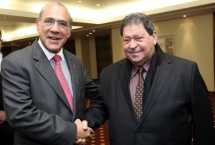The OECD's macroeconomic report criticizes Bank of Israel's policy of intervening in the foreign currency market
The OECD's macroeconomic report submitted to the Ministry of Finance last week reiterates several criticisms made in recent years: the writers noted that Israeli economy demonstrated soundness during the economic crisis, and is in general a success story.
However, fiscal policies are not sufficiently transparent, cuts in social services have reached their limit, and it will actually be necessary to increase social spending in the future. It is necessary to reconsider the wisdom of cutting company and incometaxes, while it is necessary to continue reducing the debt-to-GDP ratio.
The OECD macroeconomic report also criticizes the Bank of Israel's policy of intervening in the foreign currency market, because of the possible harm to the credibility of monetary policy.
The OECD also advices Israel to slash the purchase tax on private cars. The chapter on taxes harshly criticizes the purchase tax on cars, saying that there is no justification for such a high purchase tax. The recommendation is included in the OECD final report on Israel's accession to the organization submitted to the Ministry of Finance.
OECD Secretary General Angel Gurria said in Jerusalem, following a meeting at the prime minister's office with the social economic cabinet, that "2010 is the target year for completing Israel's accession process to the OECD”.
Gurria presented Minister of Finance Yuval Steinitz with two reports - the first about macroeconomics and the second about employment and welfare.
As Israel approaches the final stage of being accepted as a full member, the organization is urging Israel to tackle three critical issues regarding anti-corruption policy measures, in particular in the defense industry; compliance with intellectual property legislation common in OECD member countries; and the exclusion of statistics relating to territories, which are not considered part of the country.
One of the major stumbling blocks to reach membership is the insufficient progress Israel has made in passing laws to better fight corruption.
The 38-country OECD Working Group on bribery last month urged Israel to step up its fight against bribery in international transactions, especially arms deals, if it wishes to join the OECD. Although Israel signed the OECD's Anti-Bribery Convention in March last year, implementation and enforcement of the convention, which outlaws bribery of foreign public officials in international business transactions, has been lagging behind.






